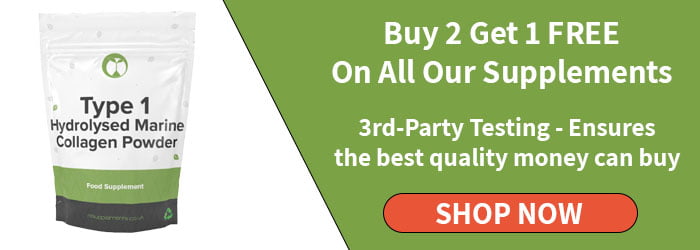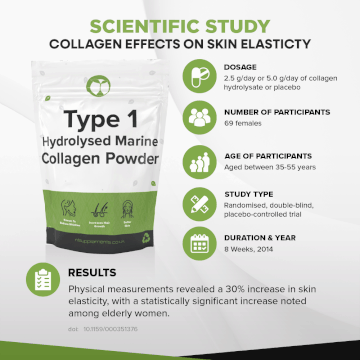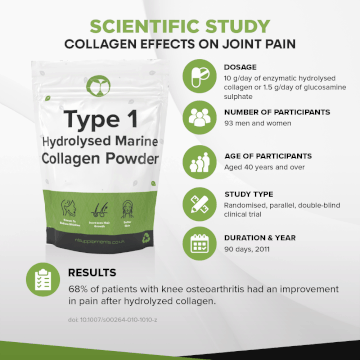 To Summarize:
To Summarize:
Clinical research has found associations between collagen supplementation and reduced face wrinkles, improved skin elasticity, increased skin softness and decreased joint pain.
Collagen is the body’s main building block. It is a major component of bone, skin, muscles, tendons, and cartilage and helps to make tissues strong and resilient, able to withstand stretching. As you age, your existing collagen breaks down, and it gets harder for your body to produce more, which is why many take a Collagen supplement.
This article highlights 4 studies whose results support these claims.
STUDY 1: Face Wrinkles.

Study Design: This study was a randomized, triple-blind, placebo-controlled trial.
Objective: To evaluate the effects of fish-derived collagen peptide on skin wrinkles, elasticity, and self-reported skin appearance.
Methods for Assessing Skin Wrinkles: Utilized imaging technology to evaluate wrinkles, damage, and ageing signs not visible to the naked eye.
Dosage: Participants received either 10 g/day of hydrolyzed collagen or a placebo powder.
Participants: 50 females, aged between 45-60 years.
Duration: 12 weeks.
Year of Study: 2021
Findings:
Collagen supplementation was associated with significant reductions in facial wrinkle scores (lower scores indicating better results) compared to the placebo group.
Participants taking collagen reported greater improvements in:
- Overall skin appearance (9% improvement)
- Wrinkles (15% improvement)
- Skin elasticity (23% improvement)
- Hydration (14% improvement)
- Radiance (22% improvement)
- Firmness (25% improvement), all compared to the placebo group.
STUDY 2: Skin Elasticity.

Study Design: Randomized, double-blind, placebo-controlled trial.
Objective: To evaluate the effects of collagen hydrolysate containing specific collagen peptides on skin ageing parameters.
Dosage: Participants received either 2.5 g/day, 5.0 g/day of collagen hydrolysate, or a placebo.
Participants: 69 women aged between 35-55 years.
Duration: 8 weeks.
Year of Study: 2014.
Key Findings:
- Both 2.5 g and 5.0 g dosages of collagen hydrolysate were associated with statistically significant increases in skin elasticity after 4 and 8 weeks.
- A notable increase in skin elasticity of up to 30% was observed in some women after 8 weeks, especially among elderly women in the treatment group.
STUDY 3: Skin Softness.

Study Type: Randomized controlled trial.
Purpose: To assess the effects of a hydrolyzed collagen supplement on skin moisturization, smoothness, and wrinkles.
Dosage: 1st month: 1g/10 kg body weight/day (dissolved in water in the morning, during/after breakfast) or placebo. 2nd month: 5 g/day of hydrolyzed collagen (same method of intake) or control (maltodextrin).
Participants: 52 healthy females aged 40-60 years.
Duration: 56 days.
Year of Study: 2022.
Results:
Significant improvements in skin moisturization and a decrease in wrinkle depth over 28 and 56 days.
Increased skin elasticity, a factor in reducing wrinkles and promoting a youthful appearance.
Clinical evaluations showed significant improvements in:
- Skin softness: Improved in 35% of collagen group participants after 28 days, 54% after 56 days.
- Skin smoothness: Statistical improvements in 27% of participants after 28 days, 46% after 56 days.
- Skin firmness: Improved in 58% of participants after 56 days.
- Reduced wrinkle visibility: Noted in 38% of participants after 56 days.
STUDY 4: Joint Pain.

Study Type: Randomized, parallel, double-blind clinical trial.
Purpose: To compare the effectiveness and safety of oral hydrolyzed collagen versus glucosamine sulphate in early-stage knee osteoarthritis patients.
Participants: 100 men and women aged 40 years and older with knee osteoarthritis (93 completed the trial).
Duration: 90 days.
Year of Study: 2011.
Results:
- Significant reduction in pain intensity observed in both collagen and glucosamine sulphate groups.
- Greater pain relief in the collagen group, with 68% showing clear improvement, compared to 37% in the glucosamine sulphate group.
- A higher percentage (34.8%) of the collagen group reported improved health status (pain, stiffness, physical function), compared to 13.3% in the glucosamine sulphate group, a statistically significant difference.
- The collagen group also reported better improvements in quality of life.
- Both investigators and patients subjectively favored collagen over glucosamine sulphate.
Our commitment is to support health and wellness, and our guides aim to empower you with the knowledge to make informed decisions about your well-being.
We are proud to hold a 5-Star Hygiene Rating, a testament to our unwavering commitment to quality and safety. You can view our rating here.
Our products are non-GMO, not tested on animals, and are crafted by our HCCAP-certified food hygiene and manufacturing staff.
Our Scientific Studies Database and 3rd Party Tests sections provide additional insights and transparency about our products, while our Reviews section offers firsthand experiences from our valued customers.
We appreciate any feedback or inquiries related to our content as part of our mission to uphold accuracy and transparency

